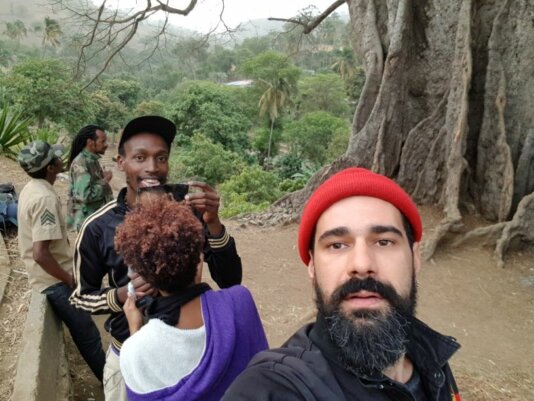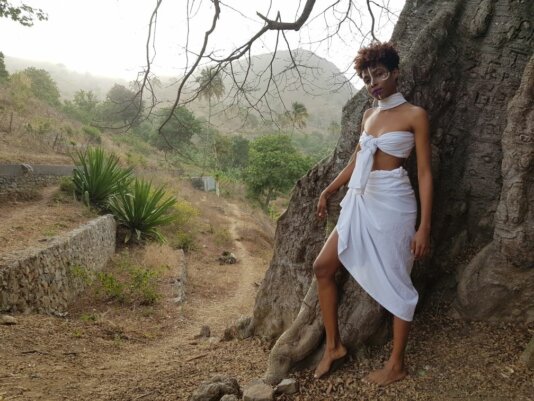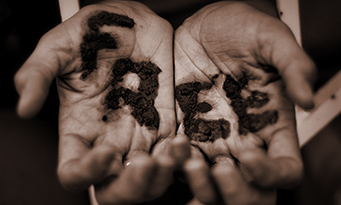- About
- Topics
- Picks
- Audio
- Story
- In-Depth
- Opinion
- News
- Donate
- Signup for our newsletterOur Editors' Best Picks.Send
Read, Debate: Engage.
| September 01, 2020 | |
|---|---|
| topic: | Arts |
| tags: | #african slave trade, #independent film, #Cape Verde |
| by: | Murat Suner |
FairPlanet: How does it feel to be an award-winning documentary filmmaker?
Sélim Harbi: It is a great feeling to see your own work recognised and valued, the symbolism of it is important for every creator. In general, though, I think that clichés of the Red Carpet walk, bleached teeth smile with a golden statue in the hand, are collapsing as the world and the media economy are changing. Satisfaction comes mainly from seeing your work reaching its target audience and from the feeling of being sharp on time with current issues.
Tell us what the story of the documentary is about?
Neguinho, "The small nigga", is what former Portuguese slave traders used to call black people. In a country whose narrative is based on slavery, Renato — his real name — is transcending this tag to reinvent his own reality and seek a gateway to freedom. Teaching Capoeira is his response to the lack of education in his country Cape Verde, a form to connect reconnect with his ancestral roots.
The German philosopher G.W.F. Hegel once made the denigrating statement that Africa has no history. Call Me Neguinho is an African story directed by you as an African filmmaker, featuring an African protagonist, shot in the African Island Cape Verde, and screened on an African film festival. What has your motivation been to act from an all African perspective?
Despite the huge and important work of Hegel, especially in the dialectic as a foundation for western philosophy, Hegelian universalism was a Eurocentric and exclusive frame. In fact, many consider Hegel as one of the main contributors to Colonial Theory. It shaped the southern deep trauma and engaged the north-south relations as power dynamics based on a "Maitre-esclave" status quo.
I refer often to Cheikh Anta-Diop who made a huge contribution to scientifically prove the existence of large body of knowledge and philosophy in Africa centuries before Western philosophies which makes Hegel's statement just pitiful and ridiculous.
My motivation was mainly to reappropriate the narrative, to tell a story with a universal sense as a reminder for our collective memory, to set a moral marker: Slavery was a crime against humanity, and the effects of it are still with us, with fragments of dispatched memories, with deep traumas.
I also did that work to give, maybe, a sign to emerging African filmmakers: It is high-time to go out and capture your realities! Also, to address this work to African audiences is an important matter, breaking the "Prêt-a-porter film" machinery, where we found ourselves, for years, just blindly delivering African films for Western audiences, according to Western norms and aesthetics. That should stop. Africa definitely has better to offer.
Documentaries, like other forms of storytelling such as books or music, can be powerful ways to open conversations in the present but also, as you mentioned, help to build archives of collective memories of the past. How do you evaluate both in the African context?
It is a very complex issue not only depending on Africa and Africans, but when it comes to archives, we touch the past, the present, and the future, as well as the rest of the world. It is today a highly politicised issue. Especially with the African artefact repatriation debate, where western museums lost a lot of their credibility as places of memory. This African memory hold-up started with the colonisation, and the process was perpetuated afterwards.
I am not a specialist in the field, but as an African artist, I can just say: You took it, you bring it back! And I know that is not an easy step to do for many reasons, because accepting to repatriate means acknowledging that they have been looted. It may sound radical and could have important consequences, but in my eyes, it is the first step. The infrastructure, the right conservation policies, and the means to bring it back to life in its natural environment are matters for the countries of origin to figure out.
These memory forms, even de-naturalised and exoticised ones in the name of Universalism, embody high-intellectual, spiritual, meanings. In a great article in Le Monde, the Belgian-Congolese gallerist Didier Claes warns that 99% of African classic contemporary artworks are outside the continent.
Personally I had a glimpse of how hard it is to have access to African archives, and documents from the African perspective. In my ongoing VR Project Afroroutes, which is an experience tracking the African diaspora spread around the world with the slavery trade legacy. As I wanted to avoid the Amistad narrative and look beyond, I almost didn't find anything from the African perspective and many documents were well “jailed” in Western libraries and institutions.
I decided to change the game and focus on another type of archive, timeless, precise, open, and accessible: Oral storytelling and music, which are for me the meta-archives.
So how do you think storytelling can help to develop Africa’s relationship with the rest of the world?
The storytelling tradition in Africa is unbelievably rich, powerful, diverse, and multi-medial, and it has been influencing many other cultures in the past, in the present, and will do so in the future. Africa is everywhere if you look at the clubbing culture, and how African music took the world by storm, if you look to fashion, to food, etc. These are facts, realities. But are we really listening to African stories? Are we seeing African and Africa as it really is? It should first of all start with an awareness shift, and an eye-level perception.
Storytelling is indeed a powerful tool, or a catalyst for common understanding, but is not enough to make films. As long as most of African filmmakers are looking magnetically to fund, produce, show, and distribute their films from the North, it is going to feed the same dynamic. Self-criticism is important for Africans to question the meta-sense of their work as it is important for the rest of the world to question its privilege and sense of humility.
You have been travelling and working in many African countries. What is your personal experience regarding the filmmaking scene and industry in those countries?
The potential is huge, you need an army of filmmakers to tell all the stories. I will underline what I mentioned earlier: In Africa, there is, unfortunately, a one-directional film industry, except maybe Nollywood. Despite the high calibre of filmmakers, the existent audience, and the huge amount of stories, and storytelling tradition, there is a lack of infrastructure, public funds, and local film structures, which makes the film industry totally suffocating and dependent on external funding systems. There are almost no African-African film funds, there no real distribution mechanisms, and sadly very little political will.
Despite all those hurdles, a great dynamic is happening, on guerrilla-style, intrusive, low, or even no budget. There is some hope also, we saw in the last years, a strong statement coming from the African diaspora around the world, making engaging films, and trying to shift the dynamics, as they have access to two or more intellectual libraries.
There is certainly not a lack of talent but often a lack of opportunity for filmmakers in Africa. The continent is still suffering from the preconditions given by colonialism, slavery, and partly as a consequence also political and economic deprivation. How do you see the situation against this backdrop from your perspective? How does the new generation in Africa cope with these obstacles?
The digital is bringing a part of the answer, many talented African artists, are using the digital as a tool of creation, distribution, and impact. Look at artists like Davido, or Wizkid who started by dropping homemade music videos online, getting up to eight million views each time, upgrading quality slowly and ending up with sold-out concerts around the world.
The local audience is also part of the solution, Africa has 1.2 billion inhabitants, which is a huge market for various fields of creation.
Mobility is also another gigantic hurdle, to move from an African country to a neighbouring country is a pain in the ass, expensive, and administratively complicated. How can any creative industry flourish if mobility is not fluid, if it is restricted?
Security may be also a hurdle to root strong, and long-term manifestations. We saw over the last few years a rife phenomenon of a new cultural appropriation, and intellectual gaslighting, where Africa is on every mouth, and super trendy. It is up to each African artist to stand for what it seems to be important, as I think solidarity between African artists is a must.
And do you look optimistically into the African future of filmmaking?
We have been repeating it for years: Africa is the future! True, but regarding filmmaking very little in my eyes, it can be way more!
When it comes to African filmmaking, I am deeply convinced that the future is depending directly on the ability of politicians to take courageous engaging decisions, to put in place courageous policies helping implement independent and corruption-free institutions, and to provide different and long-term funding streams, finally to let emerge a fluid efficient distribution networks.
On the other hand, it is depending on the level of awareness of the filmmaker themselves, in order to create the cinema that resonates with local audiences first, and the rest of the world second.
As a filmmaker, what do you wish for your own future?
Honestly, I wish first to see a healthy global reason rehabilitated, regardless of origins, race, and all that bullshit. As a filmmaker, I would love to see my work as a pleasant experience, as a natural process, not as a perpetual running-behind one thing or another. I’d like to live it as a unique and respected perspective of the world in my own eyes, not as a tactical move to enter any kind of club to please X or Y agenda. I want to make films that empower the most vulnerable, and engage us all as human beings.
I want to see the film industry in Africa as a real vector of economic growth. I believe that nowadays it is hard to do things alone, my wish, therefore, is to join forces with more interesting and like-minded people.
By copying the embed code below, you agree to adhere to our republishing guidelines.



